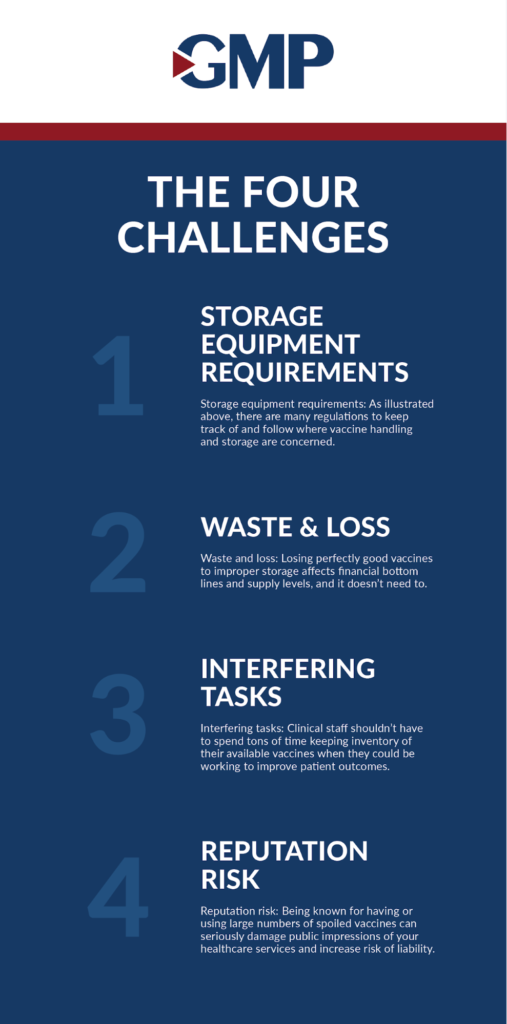One of the most common issues with immunization treatment is figuring out how to store and handle vaccines so they do not spoil or go to waste. Vaccines are sensitive medical resources that must be cautiously maintained in order to serve their intended use. That’s why vaccine management is so important to the healthcare industry. Without it, lots of vaccines—and lots of money—go down the drain.
Vaccine Management Defined

A vast number of vaccines exist in the world today, thanks to the pioneering efforts of historic figureheads like Dr. Edward Jenner, creator of the smallpox vaccine, and Jonas Salk, creator of the polio vaccine. We know more than ever before about preventing and fighting infectious and contagious disease due to the advanced nature of immunization chemistry and treatment. But equally important to the application of vaccinations is the lead-up to their use.
As each vaccine needle is individually produced for a single use, and most insured Americans have immunization treatment built into their healthcare plans from infancy, vaccines are used constantly and must be mass-produced. But how is the step between fabrication and treatment, which is storage and handling, accomplished? The answer is more complicated than you might think. It involves high-level regulations, guidelines and advanced refrigeration, preservation and usage tracking.
Government Regulations
The federal government has issued statues and guides through different agencies regarding how vaccines are to be properly stored and controlled before being delivered to patients.
Center for Disease Control
The Center for Disease Control (CDC) is one of the foremost organizations for combating illness in not just America, but also the world. Their expertise is widely known and respected, and they have a lot to say when it comes to how immunization therapy is done. An entire chunk of their website is dedicated to proper vaccine procedures. The purpose of this website is to give plenty of information and resources to healthcare professionals regarding how to safely and securely maintain their stock of vaccines. To that end, the CDC recommends following the guidelines laid out in a toolkit that they produce known as the Pinkbook. This Pinkbook includes 22 chapters on vaccine theory and practice, but information on storage and handling specifically can be found in Chapter 5. This chapter discusses:
- Storage and Handling Plans: Every healthcare provider or group that uses vaccines on a regular basis must have written records and plans for how they will administer vaccines to patients. All routine plans must include proper documentation on:
- Ordering and accepting vaccine deliveries
- Storing and handling vaccines
- Managing inventory
- Managing potentially compromised vaccines
- Staff Training: Before healthcare professionals can keep track of and administer immunizations, they must first be trained on proper technique to make sure the vaccines stay viable. Some of these duties include:
- Ordering vaccines
- Overseeing proper storage and recording
- Organizing
- Temperature monitoring and regulating
- Daily inspection
- Proper transportation
- Maintaining equipment
- Proper Storage: Vaccines can’t be stored in just any freezer or refrigerator. This section discusses the specific technology that must be utilized to keep them from going to waste. It also describes how to keep tabs on the status of temperature monitoring devices and how to properly maintain the functionality of vaccine dispensing machines.
- Labeling and Inventory Controlling: Vaccines must be properly labeled so as to be identifiable and such that healthcare staff can keep an accurate record of what they have on hand. This includes keeping track of expiration dates and proper storage temperatures.
- Offsite Transport: This section describes how vaccines are to be moved from place to place and site to site as additional distribution is needed, especially if they are being administered in an area outside of a clinical setting.
- Preparation and Disposal: This final part discusses the proper administration of immunization treatment and how to safely dispose of used vaccine containers and needles.
This may seem like a lot of regulations, but as the science of immunization is meticulous and the health—and often life—of the patient is at stake, it’s far better to be safe than sorry. And since children are often the recipients of vaccines, extra care must be taken to ensure their wellness. The updated 2020 Pinkbook can be found on the CDC website.
World Health Organization
Vaccine management is important worldwide, especially in places where access to vaccines is limited or nonexistent. That’s where the job of the World Health Organization (WHO) comes in. Their policies include management and logistics support, which involves identifying immunization needs, keeping records, overseeing vaccine distribution, establishing standard operating guidelines and more. They also have a wastage rate calculator to predict and monitor the number of vaccines that end up unused and/or destroyed during a given time period. And since, once again, one of their primary patient demographics is children, they have a set of pediatric guidelines for the delivery of vaccines around the world.
Why Should Hospitals Care?

Hospitals and other clinical settings are constantly giving out medicine and immunizations. But for those treatments to be administered, providers must first have a good stock. Because of this, proper vaccine storage and handling is of utmost importance. Every clinical setting needs to have processes and procedures set up for the purpose of maintaining the viability of stock. Records must be tracked, labels must be accurate and individual storage temperatures must be controlled.
With so many immunizations available to the general public, it can be difficult to keep track of what is available and currently on hand. Children’s vaccines in particular are used so often and in so many different formulations and doses that healthcare professionals can’t afford not to keep track. That’s why the CDC and WHO have issued such detailed regulations on how the industry is to handle immunization tasks.
How the Department of Defense Uses Vaccines
The Department of Defense (DoD) is a major user of vaccine resources. Not only do they need to provide treatments and disease protection for our uniformed services, but they also have those soldiers’ family members and staff across the nation to take care of through military healthcare, along with many other categories of people.
The Military Health Website has Department of Defense information and resources available for regulating how vaccine storage and delivery is to be handled in military-related scenarios. Among these DoD vaccine management resources is their FAQ page, which goes to great lengths to answer any question that might be posed about vaccination. Their vaccine recommendations page contains details on recommended immunization programs to follow. They also provide a comprehensive list of diseases that they use vaccine treatment to fight, such as chickenpox, shingles, smallpox, Hepatitis A and B, HPV, influenza, polio, typhoid and pneumococcal diseases.
As a government entity like others that have been listed, it is imperative for DoD immunization healthcare procedures that proper access to and plans for maintaining vaccines are available. They have a huge populace to keep healthy, and they have the added challenge, like the WHO, of providing disease protection to people on an international scale.
How TruMed Can Help
Vaccine management is important to patients and providers the world over. It assists with providing health benefits to patients and making sure they’re able to stay well when diseases are spreading. But to have reliable access to immunization, as discussed above, you need to have proper technology and techniques for maintaining stock. That’s where TruMed comes in. Their vaccine solutions can help your organization keep its stock viable, safe and secure while also helping you keep a good record of what you have available. TruMed systems are your answer to vaccine storage and handling.
Four Challenges

TruMed finds in general that there are four main challenges to proper vaccine storage that every clinical setting needs to overcome. These include:
- Storage equipment requirements: As illustrated above, there are many regulations to keep track of and follow where vaccine handling and storage are concerned.
- Waste and loss: Losing perfectly good vaccines to improper storage affects financial bottom lines and supply levels, and it doesn’t need to.
- Interfering tasks: Clinical staff shouldn’t have to spend tons of time keeping inventory of their available vaccines when they could be working to improve patient outcomes.
- Reputation risk: Being known for having or using large numbers of spoiled vaccines can seriously damage public impressions of your healthcare services and increase risk of liability.
The Answer: AccuVax
The AccuVax vaccine management system is a sophisticated set of advanced freezers, refrigerators and other vaccine storage units that have the ability to quickly access an immunization sample while keeping the rest of the stock unaffected. It involves digital interfaces, vaccine stock scanning, single item dispensing and an electronic database of current inventory.
Temperature Control
Another feature of the AccuVax system is the temperature management option that helps keep vaccines viable. Different vaccines are kept at different temperatures, and to maintain quality and reduce wastage, this measure helps ensure that each vaccine is stored at the necessary temperature for preservation.
Battery Backup
Beyond temperature control, AccuVax systems also include battery power backups with 9 to 15 hours of life in case a power outage occurs. As a result, vaccine wastage will not be something clinical staff have to worry about as much in the event of an emergency situation.
Wastage Protection
Wastage protection is a primary part of AccuVax vaccine management technology. The WHO estimates that over half of vaccines are wasted annually because of inadequate storage, transportation and handling techniques. It’s vital for patients and providers alike that vaccines be protected against temperature fluctuation and expiration. Additionally, vaccine spoilage isn’t just a matter of having enough on hand—it’s a matter of wasted finances, too. AccuVax can help ensure that your investment in patient health is secure. It’s an award-winning vaccine management system that you can trust to ensure your immunization treatments are ready to go whenever you need them.
AthenaHealth
TruMed recently announced a partnership with AthenaHealth that they also hope will further the cause of getting vaccines to where they need to go. AthenaHealth is a reliable, cloud-based healthcare IT network which keeps track of patients’ electronic health records (EHRs). Their Marketplace includes software and apps to assist with this, and TruMed is proud to have an app that is integrated with their systems. This app helps EHR software communicate with AccuVax vaccine dispensers to ensure that prescribed immunizations are correctly drawn up for the patient at hand.
This collaboration helps medical professionals do their jobs quickly and efficiently and reduces cost. It provides them the assurance that they have options available to treat patients, and that even if stock is low, it can be quickly refilled again with an accurate inventory system keeping track of every submitted and dispensed vaccine.
Doing Their Part for the Healthcare System
The American healthcare system is complicated enough without providers having to worry about whether the treatments they order for their patients are available and of good quality. TruMed wants to make sure that clinical professionals have the resources they need on hand when they need them, without having to be concerned about whether those resources actually work. Their technology and partnership with AthenaHealth is their attempt to do their part to streamline and improve the quality of modern healthcare.
If you need help managing your stock of vaccines according to proper regulations and your organization’s set procedures, TruMed is here to help.
